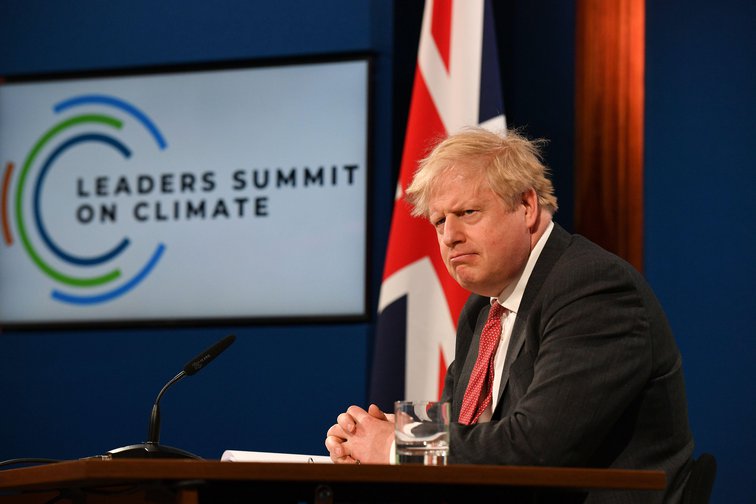Don’t let Johnson muddy the water – the lobbying scandal is about contracts, not unions
It is bizarre that we are talking about further regulation of unions and charities in response to a scandal about Conservative Party sleaze
Antonia Bance
30 April 2021

Boris Johnson is looking to deflect attention away from Tory Party sleaze |
PA Images / Alamy Stock Photo
The past few weeks have seen a cascade of revelations about cash for influence and corporate lobbying within the UK government. It’s clear that the rules aren’t fit for purpose.
The union movement supports transparency and safeguards to ensure corporates can’t buy influence and government contracts are awarded fairly.
That’s why we at the Trades Union Congress (TUC) think that big corporates should have to declare their in-house lobbying and influencing operations in an expanded lobbying register – not just their use of third-party lobbyists, as at present. And alongside that, the targets of lobbying – ministers, special advisers, senior civil servants, and the leaders of regulators and other public bodies – must be required to disclose their contacts and meetings, in some detail and in a timely fashion. We also support calls for stiffer punishments for breaking the rules on the Freedom of Information Act.
Most importantly, though, we need much more transparency in the awarding of government contracts.
Just look at procurement of medical and protective equipment in the pandemic. Week after week, the evidence piles up of a ‘VIP fast lane for firms with links to the Conservative Party. Health secretary Matt Hancock oversaw contract awards to companies linked to his friends and family (and, indeed, himself). His department’s failure to publish details of contracts awarded was also ruled unlawful by the high court. The Public Accounts Committee found that leads given highest priority for PPE supply “were those from government officials, ministers’ offices, MPs and members of the House of Lords”.
There is no reason to include charities or unions in an expanded register of lobbyists. Both are already highly regulated
What this meant was that the government “wasted hundreds of millions of pounds on PPE which is of poor quality and cannot be used for the intended purpose”. The National Audit Office (NAO) found that “insufficient documentation on key decisions, or how risks such as perceived or actual conflicts of interest have been identified or managed”.
To ensure there is far greater transparency in government procurement, ministers should publish all contacts and links they have with firms awarded government contracts.
Contract secrecy could be about to get worse, not better
The NAO points out that there is too little information in the public domain to conduct an effective analysis of the performance of, and rewards for, major contractors delivering publicly funded services. Neither the Cabinet Office nor the Treasury have reliable or complete data on contracts let in Whitehall. Nor is there consolidated data for the NHS, local government or the devolved administrations.
In 2019, in the wake of the collapse of construction and outsourcing giant Carillion, the TUC called on the government to produce a Domesday Book of government contracting – a public sector-wide record of contracts awarded, performance and company data.
Related story

How Cameron’s vow to clean up lobbying turned into a loophole-ridden sham
15-04-2021 | Tamasin Cave
Previous parliamentary inquiries into lobbying have gone ignored. It’s hard to imagine Johnson’s will be any different
But far from increasing transparency, the government is now proposing to expand the scope for the use of informal tendering. Plans set out in its Transforming Public Procurement green paper would give new powers to the cabinet secretary to declare crisis conditions that would allow greater use of ‘direct awards’ – contracts let without competition. They would also exempt contracts from automatic suspension even if they were being legally challenged. Such plans would formalise the short-cuts we saw in the pandemic, and make it even easier for minsters to award contracts to their friends.
This scandal started with David Cameron, a former Conservative prime minister, attempting to influence senior Conservative ministers on behalf of now defunct finance firm Greensill Capital. We must keep the focus on corporate lobbying and the award of contracts.
Unions and charities are a predictable distraction
Some MPs will want, for their own reasons, to divert attention from Tory sleaze. They will seek to draw on the conduct of charities and unions in influencing policymaking. It’s a predictable distraction, and one we should be prepared for. Johnson himself pulled this trick, responding to a recent question from Labour MP Matt Western about Tory sleaze and “big donor bungs” by claiming it is Labour which is soft on lobbyists “because of its relationship with the trade unions”.
There is no reason to include charities or unions in an expanded register of lobbyists. Both charities and unions are already highly regulated.
Charities must not have political purposes, must be party-politically neutral, and may only campaign in tightly circumscribed circumstances in the pursuit of their charitable objectives.
Unions are some of the most regulated organisations in the UK – and have been subjected to even more onerous transparency requirements recently, in the 2014 and 2016 Trade Union Acts. Unions have to make detailed disclosures of our membership, financial affairs, industrial action and political activity. If we want to spend money on political activities, unions must create a separate opt-in political fund. Every ten years this fund must be re-authorised in a ballot of all members. And every year unions have to report and publish detailed information about how they spent their political fund to the Certification Officer.
We support transparency in lobbying. But it is bizarre that we are talking about further regulation of unions and charities in response to a former Conservative prime minister lobbying his Conservative successors on behalf of his current employer.
We should instead seize this moment to find out who ministers and special advisors are meeting, make departments comply with freedom of information laws, and clean up the awarding of government contracts







